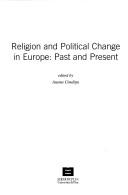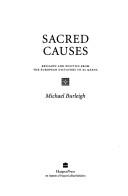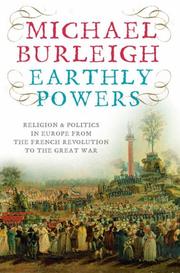| Listing 1 - 10 of 19 | << page >> |
Sort by
|

ISBN: 8884921414 9788884921413 Year: 2003 Volume: 8 Publisher: Pisa: Plus,
Abstract | Keywords | Export | Availability | Bookmark
 Loading...
Loading...Choose an application
- Reference Manager
- EndNote
- RefWorks (Direct export to RefWorks)
Sociology of religion --- History of civilization --- Political philosophy. Social philosophy --- History of Europe --- Religion and politics --- Religion and politics - Europe --- Religions --- Aspect politique --- Europe

ISBN: 0007195745 9780007195749 Year: 2006 Publisher: London: HarperPress,
Abstract | Keywords | Export | Availability | Bookmark
 Loading...
Loading...Choose an application
- Reference Manager
- EndNote
- RefWorks (Direct export to RefWorks)
Examines the politics of religion and the religion of politics from the First World War until the War on Terror
Christian religion --- International relations. Foreign policy --- anno 1900-1999 --- POST-WORLD WAR II -- 327.6 --- Religion and politics --- History --- Europe --- Religion --- Religion and politics - Europe - History - 20th century --- Religion and politics - Europe - History - 21st century --- Histoire religieuse --- Europe - Religion - 20th century --- Europe - Religion - 21st century --- religion and politics --- dictators --- Soviet Union --- Spain --- Ireland --- terrorism --- 11.09.2001
Book
ISBN: 2845640005 9782845640009 Year: 1999 Publisher: Mont-de-Marsan: Ed. interuniversitaires,
Abstract | Keywords | Export | Availability | Bookmark
 Loading...
Loading...Choose an application
- Reference Manager
- EndNote
- RefWorks (Direct export to RefWorks)
Babel, Tower of --- Religion and politics --- History --- Religion and politics - Europe - History - 16th century --- EUROPE --- TOUR DE BABEL --- ANTHROPOLOGIE --- ALTERITE --- CIVILISATION --- 15E-16E SIECLES --- MYTHE --- HISTOIRE --- 16E SIECLE --- 15E-18E SIECLES

ISBN: 0007195729 9780007195725 Year: 2005 Publisher: London: HarperCollins,
Abstract | Keywords | Export | Availability | Bookmark
 Loading...
Loading...Choose an application
- Reference Manager
- EndNote
- RefWorks (Direct export to RefWorks)
"[This book] encompasses the 'philosophes' of the Enlightenment and the influence of thinkers like de Maistre and de Bonald and Lamennais, as well as the pseudo religious aspects of Marxism. It looks at painters like Zoffany and David and analyses their representations of their times; it considers the exploits of O'Connell, hero of Catholic emancipation, Mazzini, Mickiewicz and Garibaldi, and goes via nineteenth-century English and Russian literature to the epic struggles between Church and State, industry and the rise of Christian socialism, concluding with the advent of the 'old stone gods' that heralded the totalitarian political religions of the twentieth century."--Jacket
Religion and politics --- History --- Europe --- Church history --- Politics and government --- overzicht --- geschiedenis --- Europa [werelddeel] --- religie --- politiek --- Franse Revolutie --- 19de eeuw (x) --- 1900-1914 (x) --- Religion and politics - Europe - History --- Histoire religieuse --- Europe - Church history --- Europe - Politics and government
Book
ISBN: 9782840507956 2840507951 Year: 2012 Volume: 56 Publisher: Paris: Presses de l'Université Paris-Sorbonne,
Abstract | Keywords | Export | Availability | Bookmark
 Loading...
Loading...Choose an application
- Reference Manager
- EndNote
- RefWorks (Direct export to RefWorks)
History of civilization --- History of Europe --- Christian special devotions --- anno 1600-1699 --- anno 1500-1599 --- Religion and politics --- Saints --- Religion et politique --- History --- Cult --- Histoire --- Culte --- Council of Trent --- Christian saints --- Christianisme --- --Saints --- --Culte --- --Politique --- --XVIe s., --- 235.3 "15" --- Hagiografie--16e eeuw. Periode 1500-1599 --- Politics and religion / National saints / 16th-17th centuries. --- Religion and politics / Europe / History / 16th century. --- Religion and politics / Europe / History / 17th century. --- Saints / Europe / History / 16th century. --- Saints / Europe / History / 17th century. --- Heiligsprechung. --- Politik. --- Geschichte 1520-1660. --- Europa. --- Sainteté --- Canonisation --- Église et État --- Aspect politique --- Kerkgeschiedenis (nieuwe tijd) --- Hagiologie --- Christian saints - Cult --- Politique --- XVIe s., 1501-1600 --- Culte des saints
Book
ISBN: 2070777340 9782070777341 Year: 2006 Publisher: Paris: Gallimard,
Abstract | Keywords | Export | Availability | Bookmark
 Loading...
Loading...Choose an application
- Reference Manager
- EndNote
- RefWorks (Direct export to RefWorks)
Political philosophy. Social philosophy --- Political systems --- Theory of the state --- Europe --- Democracy --- Religion and politics --- Démocratie --- Religion et politique --- Philosophy --- Philosophie --- National state. --- European federation. --- European federation --- Political science - Democracy - Europe. --- Nation-state. --- BPB0603 --- 321.7 <4> --- 940 --- Democratie. Plurale samenleving. Pluralisme. Democratische pluraliteit--(moderne democratie politieke stelsels)--Europa --- Geschiedenis van Europa, van het Westen, van het Avondland --- 940 Geschiedenis van Europa, van het Westen, van het Avondland --- 321.7 <4> Democratie. Plurale samenleving. Pluralisme. Democratische pluraliteit--(moderne democratie politieke stelsels)--Europa --- Démocratie --- 940 History of Europe. History of the West --- History of Europe. History of the West --- Democracy - Europe. --- Religion and politics - Europe. --- Democracy - Europe --- Religion and politics - Europe
Book
ISBN: 9782812401244 2812401249 Year: 2010 Volume: 7 Publisher: Paris: Classiques Garnier,
Abstract | Keywords | Export | Availability | Bookmark
 Loading...
Loading...Choose an application
- Reference Manager
- EndNote
- RefWorks (Direct export to RefWorks)
Religion and politics --- Religion et politique --- History --- Histoire --- Sarpi, Paolo, --- Europe --- Intellectual life --- Vie intellectuelle --- Political and social views --- 929 SARPI, PAOLO --- Biografie. Genealogie. Heraldiek--SARPI, PAOLO --- Conferences - Meetings --- 929 SARPI, PAOLO Biografie. Genealogie. Heraldiek--SARPI, PAOLO --- Political science --- Politics, Practical --- Politics and religion --- Religion --- Religions --- Religious aspects --- Political aspects --- Paolo Servita --- Soave, Petrus --- Polano, Pietro Soave --- Sarpi, Paolo --- History. --- Religion and politics - Europe - History - 16th century - Congresses --- Sarpi, Paolo, - 1552-1623 - Political and social views - Congresses --- Religion and politics - Europe - History - 17th century - Congresses --- Sarpi, Paolo, - 1552-1623 --- Paulus Venetus --- Paolo Veneto
Book
ISBN: 9782200272135 2200272138 Year: 2013 Publisher: Paris: Armand Colin,
Abstract | Keywords | Export | Availability | Bookmark
 Loading...
Loading...Choose an application
- Reference Manager
- EndNote
- RefWorks (Direct export to RefWorks)
Si le religieux est aujourd'hui affaire personnelle et n'est pas censé interférer avec le politique, il en allait tout autrement dans l'Europe moderne. Dans l'ancien monde, où la religion était structurante et commandait à tout et tous, le christianisme a forgé des concepts essentiels à la régulation des sociétés. Trois principes ont façonné les rapports entre Eglises et Etats : l'autorité vient de Dieu, les pouvoirs temporel et spirituel sont indépendants, les fins humaines sont subordonnées aux spirituelles. Ce cadre restait toutefois assez large pour justifier des politiques différentes. Les théologiens n'ont pas dicté une réponse unique quand le souverain, fût-il le pape, se trouva confronté à un conflit. Déstabilisées par les réformes du XVIe siècle, les monarchies surent tirer profit de la dislocation de la Chrétienté latine, abandonnant la guerre religieuse pour la raison d'Etat. Aux siècles suivants, alors que le désenchantement du monde ôtait à la Création son aspect magique, l'essor du rationalisme contribua autant à extraire la religion du champ politique qu'à asseoir la tutelle de l'Etat sur l'Eglise.
History of Europe --- Christian church history --- anno 1500-1799 --- Religion and politics --- Religion et politique --- History --- Histoire --- Christianity and politics --- Church and state --- History. --- Église et État --- Christianisme et politique --- Europe --- Histoire religieuse --- Christianity and politics - Europe - History. --- Church and state - Europe - History --- Religion and politics - Europe - History
Book
ISBN: 9780415595346 0415595347 9780203803851 020380385X 9781136636417 9781136636363 9781136636400 Year: 2011 Volume: 75 Publisher: London: Routledge,
Abstract | Keywords | Export | Availability | Bookmark
 Loading...
Loading...Choose an application
- Reference Manager
- EndNote
- RefWorks (Direct export to RefWorks)
Religion and politics --- Europe, Western --- Religion --- Religion. --- -322 <4> --- Godsdienstige tolerantie. Godsdienstpolitiek--Europa --- -Religion. --- 322 <4> Godsdienstige tolerantie. Godsdienstpolitiek--Europa --- 322 <4> --- Political science --- Politics, Practical --- Politics and religion --- Religions --- Religious aspects --- Political aspects --- West Europe --- Western Europe --- Conferences - Meetings --- Religion et politique --- Europe de l'Ouest --- Religion and politics - Europe, Western --- Europe, Western - Religion
Book
ISBN: 9782204105262 2204105260 Year: 2016 Publisher: Paris: Cerf,
Abstract | Keywords | Export | Availability | Bookmark
 Loading...
Loading...Choose an application
- Reference Manager
- EndNote
- RefWorks (Direct export to RefWorks)
Rendez à César ce qui est à César et à Dieu ce qui est à Dieu ? Ce livre s'interroge sur les rapports entre religion et politique à travers les tentatives d'unification entre les Eglises anglicane et orthodoxe grecque, pendant une période historique cruciale, celle du déclin puis de la chute de l'Empire ottoman. Les ambitions mutuelles de la Grèce et de l'Empire britannique en vue d'étendre leur domination sur cette région sont à l'origine d'un rapprochement qui, tout en étant politique, s'exprime avant tout à travers la politisation de la religion dans un cadre impérial moderne, colonial ou national, au sein duquel la religion devient un vecteur légitimant cette politique expansionniste. Ce livre soulève aussi la question du modèle ecclésiastico-politique de ce projet entre Eglise universelle et oecuménique et Eglise nationale, à travers l'étude des relations entre l'Eglise et l'Etat en Angleterre et en Grèce et la portée oecuménique de l'action de chacune de ces Eglises. Enfin, l'auteur tente d'éclairer les motivations ainsi que les difficultés auxquelles le Mouvement oecuménique s'est trouvé confronté à ses débuts. En essayant d'expliquer la portée et le sens des actions et discours des agents religieux pour répondre aux défis séculiers inédits auxquels ils devaient faire face, à partir du cataclysme de la Première Guerre mondiale jusqu'à l'avènement des régimes totalitaires et les répercussions néfastes de la Grande Dépression de 1929, ce travail permet d'appréhender l'évolution des rapports interconfessionnels, entre dynamique oecuménique et reconfiguration ou reformulation des concurrences ecclésiales héritées, à l'aune des transformations politiques et idéologiques complexes de cette période.
Religion and politics --- Ecumenical movement --- 28*083 --- 28*081 --- 28*081 Orthodox oecumenisch standpunt --- Orthodox oecumenisch standpunt --- 28*083 Oecumenisch standpunt van de anglicanen --- Oecumenisch standpunt van de anglicanen --- Religion and politics - Europe --- Religion and politics - England --- Religion and politics - Greece
| Listing 1 - 10 of 19 | << page >> |
Sort by
|

 Search
Search Feedback
Feedback About UniCat
About UniCat  Help
Help News
News